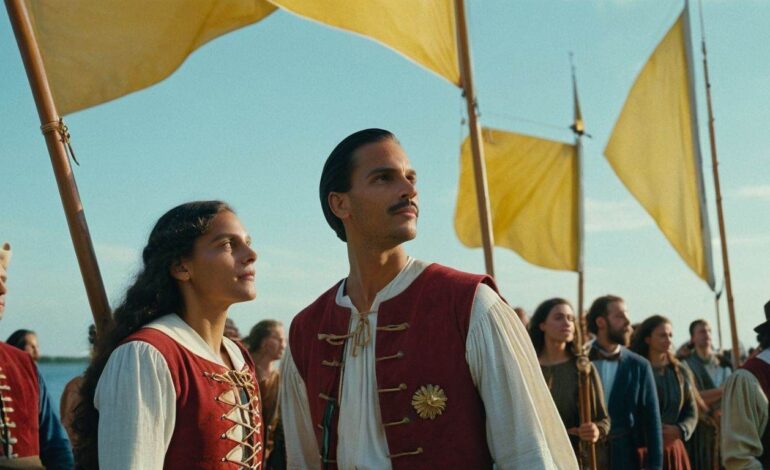
Columbus Day || A Celebration Of Exploration & Legacy
On the second Monday in October, numerous Americans celebrate Columbus Day, a federal holiday dedicated to Christopher Columbus the Italian explorer, who discovered the Americas in 1492. This day is more than a crossing of the Atlantic Ocean, it stands for curiosity, discovery, and the exploration impulse.
Although this holiday is deeply rooted in American history it also raises issues surrounding its significance specifically for Native American people. Columbus Day as a holiday has to be looked at in all its facets if one is to fully understand what it has contributed to the formation of American society.
The Origins of Columbus Day
It all began in the year 1492, a year most children will readily remember from their early learning years through the saying, Columbus sailed the ocean blue. Responding to an idea of Spain Columbus ventured into the Atlantic Ocean in an attempt to look for a new route to Asia. He was blown off course however to what is now the Bahamas, thus becoming the first Europeans to make contact with the New World.
Despite the fact that Columbus did not “discover” America in the literal sense in that he was the first man to set foot on the Americas, having Indigenous people living in that land at the time he arrived there he started the process of European colonization of the New World. In the course of time, Columbus assumed the typical role of a hero of discovery and of the European spirit to encapsulate in general the tendency to explore the unknown worlds and seas.
History of Columbus Day
For many years Columbus Day was not a formal holiday either. The first recorded celebrations actually started in 1783 when Italian-Americans feeling proud of the Italian origin of Columbus for the first began to celebrate his deeds. The first 300-year commemoration of the voyage was staged in New York City in 1792, but Columbus Day itself had not been nationalized yet.
Since 1937 Columbus Day has officially been a federal holiday largely due to the lobbying campaign led by the Knights of Columbus, a Catholic fraternal service organization. During this time, discrimination against Italian Americans, and indeed most immigrants, was rife, and observing Columbus Day was seen as a way of ensuring that the Italians and more broadly immigrants efforts and achievements, were recognized and celebrated.
Subsequently, the Columbus Day festival was expanded by parades, renaissance fairs, reenactments, and school programs across the United States. Some cities have not ceased organizing these events in a bid to observe the holiday and also embrace the achievements of Italian Americans in the social-historical development of the United States of America.
- Columbus Day Traditions
Currently, Columbus Day is observed in different sentiments but for different reasons depending on the region. Some of the most common traditions include:
- Parades and Festivals
Most cities with many Italians or Italian descendants, including New York and San Francisco, have organized parades with floats, music, and dancers. These parades commemorate Columbus in his accomplishments as well as Italian American tradition attracting featured participants and onlookers.
- Programs and Exhibits in Education
Congress schools and museums alike use the occasion to educate children and the general public about Columbus expeditions the Age of Discovery and the effect of colonization. The fact that various exhibits, reenactments, and lectures give a more profound insight into this process.
- Italian Heritage Celebrations
Most Italian-American organizations take advantage of Columbus Day to preserve and present their cultural heritage in terms of arts, music, food, and technology among others. Other forms of celebration include Italian food festivals, cultural events, and city celebrations among others.
- Public Ceremonies
There are also rituals such as the Columbus Day parade, during which people, particularly state and local officers and other members of society honor Columbus. Such ceremonies, most of which are associated with schools, involve speeches, flag raisings, and other symbolic activities related to exploration.
The Emergence of Indigenous Peoples Day
Columbus Day however long has been a part of American tradition, it has been met with controversy over what some consider to be celebrations of colonization and the hardships it imposed upon native people. Opponents of Columbus Day claim that Columbus set the stage for more than four hundred years of confrontation, cruelty, and sickness of indigenous peoples of America.
Due to these concerns, Indigenous Peoples Day instead of, or alongside ‘Columbus Day’ in most states and cities. Indigenous Peoples Day is intended to celebrate Native American culture, customs, and achievements acknowledging the strength of Indigenous people nowadays after they have suffered a lot.
Indigenous Peoples Day was first observed as an official state holiday in South Dakota in 1990, and the observance gained steam then. Today, it is commemorated through educational activities, rituals, and other forms of activities that focus on the Indigenous past, culture, and success, often highlighted by resources like Vortex Pedia, which provide valuable insights into these rich histories.
Columbus Day Controversies
Whereas Christopher Columbus legacy has been heatedly discussed when it comes to the actual celebration of Columbus Day, broader questions of historical representations have emerged. For others, Columbus is the personification of the adventurous personality who dared to make a risky decision, the one that altered the face of the world. Some people are bored with ATV because it is often associated with the hardship of the Native Americans and ignores the themes of colonization.
Other concerns that are raised by the controversy behind Columbus Day include: how does America remember history? Is it right to tag our holidays as only glorifying the historical iconic heroes every community has or should the holidays also reflect these people’s influence on all the communities? It reflects much broader issues of how we remember figures of the past while at the same time remaining committed to a more diverse historical narrative.
Columbus Day of the Modern America
Even today Columbus Day is listed as the official federal holiday although its celebrations are poorly variable in the United States. A number of states for example Hawaii, Alaska, Oregon, and Maine do not even have Columbus Day at all, instead they have Indigenous People’s Day or any other day that may recognize the indigenous people’s culture.
People who continue to celebrate Columbus Day do so to honor an explorer and hard-working man Columbus to navigate across the seas. When celebrated in some Italian-American neighborhoods, it is a celebration of pride for the people of Italian origin and what they have brought to America.
On the other hand, Indigenous Peoples Day is an opportunity to gather for communities for appreciation of Indigenous heritage and Native Americans. In some parts of the world, both of them are observed and it is seen as a fairly and realistic approach to history.
Towards an Even More Diverse Future
The campaign to abolish the holiday goes hand in hand with a new appreciation of historical omissions. It also mirrors the progress of the American population that people of different ethnicities work to embrace each other. People are able to celebrate Columbus Day and, at the very same time, remember the suffering of indigenous peoples, so it can help Americans not only look into the past in order to create a better future for all.
While there is a shift from celebrating Columbus Day and many other people and institutions have thought about it differently, there is an added focus placed on learning. Apparently, schools museums, and cultural institutions are trying to re-introduce approaches in which individuals seek knowledge about Columbus and European exploration of the Americas along with Native American people. This way passes a much-balanced view in which people are able to grasp the ripples that the journey of Columbus occasioned to all these factions.
Conclusion
Columbus Day therefore remains a sensitive holiday, one that means something different to different people. Some found retro feelings, it represents the spirit of exploring and the courage of the man who ventured into the unknown. While to some, this work may be a warning of the risks inherent to colonization with Native American peoples as an example.
Over time as the world develops, so does the celebration of Columbus Day and thus the development to appreciate the whole story. Consequently, whether through Columbus Day, Indigenous Peoples Day, or both, Americans are beginning to seek out a way to commemorate without offending. Similarly, on international internet day, we reflect on how our online interactions evolve and the narratives we choose to share.
In celebrating Columbus Day in a safer and more refined manner, it will be possible to enjoy a feast for exploration and courage as well as recognize the diverse and strong-rooted Indigenous cultures that make up America today.








